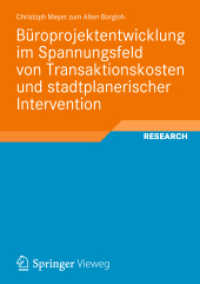- ホーム
- > 洋書
- > 英文書
- > History / World
Full Description
One of the key ways in which the traditional Jewish world of eastern Europe responded to the challenges of modernity in the nineteenth century was to change the system for educating young men so as to reinforce time-honoured, conservative values. The yeshivas established at that time in Lithuania became models for an educational system that has persisted to this day, transmitting the talmudic underpinnings of the traditional Jewish way of life. To understand how that system works, one needs to go back to the institutions they are patterned on: why they were established, how they were organized, and how they operated.This is the first properly documented, systematic study of the Lithuanian yeshiva as it existed from 1802 to 1914. It is based on the judicious use of contemporary sources-documents, articles in the press, and memoirs-with a view to presenting the yeshiva in its social and cultural context. Three key institutions are considered. Pride of place in the first part of the book is given to the yeshiva of Volozhin, which was founded in 1802 according to an entirely new concept-total independence from the local community-and was in that sense the model for everything that followed. Chapters in the second part focus on the yeshiva of Slobodka, famed for introducing the study of musar (ethics); the yeshiva of Telz, with its structural and organizational innovations; and the kollel system, introduced so that married men could continue their yeshiva education. Topics covered include the leadership and changes in leadership; management and administration; the yeshiva as a place of study; and daily life.This English edition is based on the second Hebrew edition, which was revised to include information that became available with the opening of archives in eastern Europe after the fall of communism.
Contents
IntroductionPart I The Volozhin Yeshiva1 The Beginnings of the Volozhin YeshivaR. Hayim of Volozhin * The Foundation of the Volozhin Yeshiva * The Establishment of the Yeshiva in Volozhin * Setting Up the Yeshiva and Organizing Financial Support * Curriculum and Students * Areas of Study * The Position of the Rosh Yeshiva * Yeshivas Modelled on Volozhin2 The Beginning of the Yeshiva - Succession, Conflicts, and ChangeR. Yitshak of Volozhin as Rosh Yeshiva * Change and Continuity at the Yeshiva * The Role of the Yeshiva in Society * R. Eliezer Fried as successor to R. Yitshak * R. Naftali Berlin and the Question of Authority at the Yeshiva * The Conflict with R. Yehoshua Heschel Levin * The Conflict with R. Yosef Dov Soloveitchik * The Restoration of Order to the Staff and the Yeshiva3 The Yeshiva as a Place of StudyThe Yeshiva as a Torah Study Centre * The Framework of Study * The Yeshiva Staff and their Functions * The Yeshiva's Functions4 The Yeshiva AdministrationSupervision of Studies and Examinations * The Shiur and Student Participation * The Importance of the New Mode of Study * Staff-Student Relations: Financial Support and Discipline * The Status of the Yeshiva in the Jewish World5 Students at the Volozhin YeshivaThe Decision to Study at the Yeshiva * Admission to the Yeshiva * Absorption at the Yeshiva * Integration at the Yeshiva * Student Activity and the Yeshiva's Response * The Individual Student and the Yeshiva * Students and the Local Community6 Life at the Volozhin YeshivaDaily Routine * Study Arrangements * The Yeshiva Year * Sabbaths and Festivals * Extra-Curricular Activity * The Haskalah: Interest among Students* The Haskalah: The Yeshiva's Response * Leisure Activities7 The Final Years of the Volozhin YeshivaCharity and Aid Associations * Zionist Organizations * Other Associations * Student Newspapers * Political Activity at the Yeshiva * The Financial State of the Yeshiva in its Final Years8 The Closure of the Volozhin YeshivaRelations between the Yeshiva and the Authorities * Secular Studies at the Yeshiva * Background to the Controversy over the Successor to R. Berlin * The Struggle over the Succession * The Factors in the Closure of the Yeshiva * Appendix to Chapter 8: Official Documents about the Volozhin YeshivaPart II Slobodka, Telz, and the Kolel9 The Slobodka YeshivaThe Musar Movement * R. Yisrael Salanter * The Slobodka Yeshiva * The Yeshiva's Students * Talmud Study at the `Musar Yeshiva' * Internal Problems and External Expansion * Controversy and Conflict at the Yeshiva10 The Telz YeshivaThe Foundation of the Yeshiva * R. Eliezer Gordon * The Aims of the Yeshiva * Study at the Yeshiva * Admission of Students * Basic Support for the Yeshiva Students * Conflicts at the Yeshiva * Factors in the Disruptions at the Yeshiva * R. Eliezer Gordon's Attitude towards the Haskalah and Zionism * R. Gordon's Confrontation with the Social Crisis11 The Kolel Haperushim of Kovno and the `Kolel' InstitutionThe Foundation of the Kolel and its Early History * The Kolel's Mode of Operation * Opposition and Conflicts * The Kolel of BrodskyConclusionBibliographyIndex







